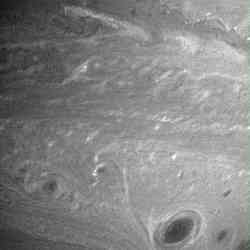
Saturn’s anti-hurricanes. Image credit: NASA/JPL/SSI Click to enlarge
Vortices mingle amidst other turbulent motions in Saturn’s atmosphere in these two comparison images. The image on the right was taken about two Saturn rotations after the image on the left.
Both views show latitudes from minus 23 degrees to minus 42 degrees. The region below center in these images (at minus 35 degrees) has seen regular storm activity since Cassini first approached Saturn in early 2004. Cassini investigations of the atmosphere from February to October 2004 showed that most of the oval-shaped storms in the latitude region near minus 35 degrees rotate in a counter-clockwise direction, with smaller storms occasionally merging into larger ones (see Saturn Movie and Saturn Movie Closeup for a movie of storm activity in this region).
On Earth, hurricanes in the Southern Hemisphere rotate clockwise. Thus, the storms in these images of Saturn’s southern latitudes could be called “anti-hurricanes.” This backwards spiraling (compared to Earth) is common on the giant planets.
The images were taken with the Cassini spacecraft narrow-angle camera on July 4 and 5, 2005, using a filter sensitive to wavelengths of infrared light centered at 750 nanometers. During this time, Cassini’s distance from Saturn was approximately 2.4 million kilometers (1.5 million miles). The image scale is about 14 kilometers (9 miles) per pixel.
The Cassini-Huygens mission is a cooperative project of NASA, the European Space Agency and the Italian Space Agency. The Jet Propulsion Laboratory, a division of the California Institute of Technology in Pasadena, manages the mission for NASA’s Science Mission Directorate, Washington, D.C. The Cassini orbiter and its two onboard cameras were designed, developed and assembled at JPL. The imaging operations center is based at the Space Science Institute in Boulder, Colo.
For more information about the Cassini-Huygens mission visit http://saturn.jpl.nasa.gov . The Cassini imaging team homepage is at http://ciclops.org .
Original Source: NASA/JPL/SSI News Release
